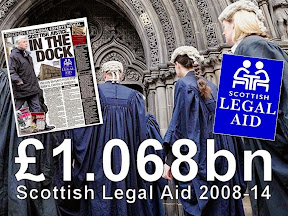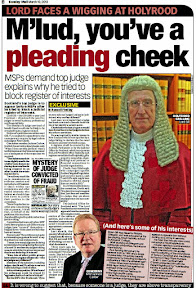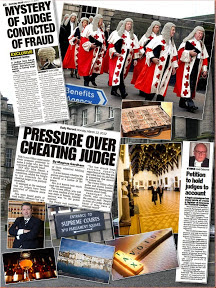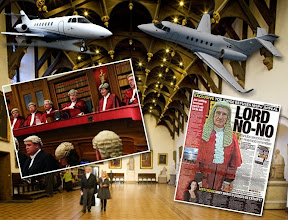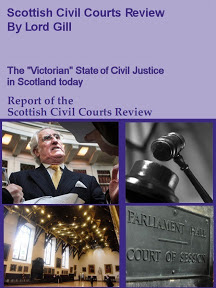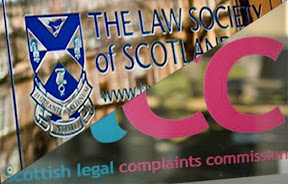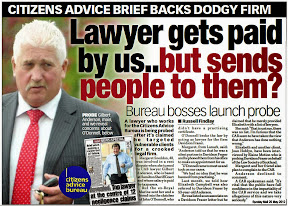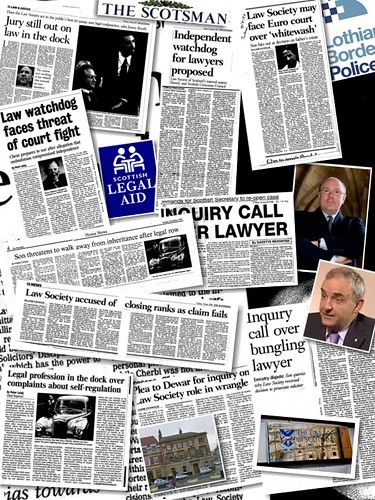Police should investigate Police – report. A FORMER Lord Advocate once accused of undermining the judiciary by Scotland’s top judge – has delivered a preliminary report as part of a review on handling of complaints and investigations against officers of Police Scotland.
However, the report from Dame Elish Angiolini on “Independent review of complaints handling, investigations and misconduct issues in relation to policing” – continues to advocate Police should continue to investigate themselves – on the vast majority of complaints.
Angiolini also goes on to outline an eerily familiar procedure where – in the case of complaints against the most senior cops – a ‘quango’ style panel will be convened and headed by Scotland’s top judge – along with selected ‘independent’ persons from other quangos or organisations – appointed to the panel by – Scotland’s top judge.
The report from Elish Anglioni – who herself is linked to lawyers & law firms which represent Police Officers against complaints – states “The vast bulk of complaints should properly be investigated by the police service itself” and “it is critical that those processes are clear, transparent and trusted”.
As far as the Police Investigations and Review Commissioner is concerned, Angiolini states that “Independent supervision and audit is also critical. In those cases rightly requiring independent investigation the police must also provide the fullest co-operation and assistance to allow timely and effective action.”
In a recommendation linked to deaths in custody, and with relevance to the death of Sheku Bayoh who died in 2015 after being restrained by police in Kirkcaldy.
Angiolini’s report states that Police officers involved in a death in custody should be separated to prevent them conferring and contaminating evidence.
This recommendation comes after what happened following the death of Mr Bayoh, where up to nine officers involved were together in the same room for more than eight hours – which led to allegations the cops conferred with each other in compiling their reports of what happened during their involvement in the incident which ultimately lead to Mr Bayoh’s death.
Angiolini’s report states “Police officers involved in a death in custody or serious incident, whether as principal officers or witnesses to the incident should not confer or speak to each other following that incident.
“Early separation of officers, other than in pressing operational circumstances, is the best way to ensure non-conferral in practice, give transparency to the process and preserve the integrity of each individual’s evidence.
“This is in the interests of both the individual police officers themselves and the public interest in order to safeguard public confidence in the integrity of their evidence.”
“In any group of people there is a danger of group-think that could contaminate or colour evidence inadvertently or otherwise.”
However, what is not revealed anywher in the report is that Elish Angiolini – has frequently used the legal services of the same lawyer – Peter Black Watson – who also represented Police Officers involved in the same incident which led to the death of Mr Bayoh.
In a BBC Disclosure investigation, it was reported : Days after his death, the Scottish Police Federation (SPF) lawyer Peter Watson told the media that “a petite female police officer was subjected to a violent and unprovoked attack by a very large man who punched, kicked and stamped on her.”
The new evidence obtained by BBC Disclosure casts doubt on this account.
More on the BBC investigation can be read here: Sheku Bayoh: Fresh questions over death in police custody
It was also reported Peter Watson – who represented Angiolini in some high profile cases – had hit out against the family of Mr Bayoh over criticisms relating to the death in custody.
BBC News reported: Peter Watson of PBW Law said: “Comments made by those representing the family of the deceased promote a completely inaccurate and misleading account.”
He added: “The officer injured remains off work, has had several hospital visits and is now in rehabilitation.
“An examination by a leading consultant confirms her injuries were significant. The injuries have been documented and photographed.
“The officers involved have never refused to provide statements. It was agreed at the outset with the Police Investigations and Review Commissioner (PIRC) that they would revert to us when they wanted statements and when they were clear on the basis that statements were to be given.
“PIRC emailed me this morning at 10:46 asking for our assistance to organise interviews and we answered at 11:29 confirming we would be pleased to assist. Those are the facts.”
Peter Watson, and also his former law firm of Levy & Mcrae, both remain as legal service providers to the Scottish Police Federation – and have represented Police Officers facing complaints, and criminal charges – yet neither are identified in Angiolini’s report nor is her use of both Watson and Levy & Mcrae flagged up as a conflict of interest issue.
The report on scrutiny of complaints against the Police comes in a tough year for Police Scotland – after the appointment of Iain Livingstone to the top post of Chief Constable even after questions surfaced over Livingstone’s suitability for the role after he once faced five allegations of serious sexual assault against a female officer.
The allegations against Livingstone – who was demoted over the sexual assault allegations and then reinstated upon appeal after the case was heard by a male-led Police tribunal – resurfaced in the print media earlier in 2019 – and in a BBC Scotland investigation into cover ups and scandals at Police Scotland.
Previous articles reporting the sexual assault allegations against Iain Livingstone are available here: Scotland’s Chief Constable & what happened to five allegations of serious sexual assault against a female officer
Full report available here: Independent review of complaints handling, investigations and misconduct issues in relation to policing
On complaints against top cops – Angiolini’s report on misconduct investigations against senior officers is critical of current procedures, and recommends responsibilities be transferred away from the Scottish Police Authority (SPA) – due to fears of familiarity between top cops and SPA figures, and a perceived lack of impartiality.
The report states: Police Scotland’s senior officers form a small group of 12 officers above the rank of Chief Superintendent. The members of this group are in regular contact with members and officials of the SPA at meetings of the Board of the Authority and its committees. The SPA, by its nature, also consists of a small group of members and executives. Regular engagement is right and proper and an essential part of the current accountability arrangements whereby it is the statutory function of SPA to hold the Chief Constable to account for the policing of Scotland. However, the regularity of that contact and the familiarity of senior police officers with board members and senior officials could lead to actual or perceived partiality, or antipathy, when it comes to disciplinary matters in which any of those same officers might be involved as the officer under complaint, a supporter to a subject, or a witness.
However, Angiolini’s solution to probes involving top cops – is to create a quango style panel of selected individuals – chaired by a very senior member of the judiciary or Scotland’s top judge – the Lord President – who will also appoint every one of the ‘independent’ persons to the quango style panel hearing complaints against senior cops.
From the report: The key stages of the senior officer misconduct proceedings (both misconduct and gross misconduct) should in future be removed from the responsibility of the SPA and made subject to consideration by an independent legally chaired panel appointed by a very senior member of the judiciary such as the Lord President. The Lord President should be consulted on this matter. The other members of the Panel should consist of an expert in senior policing and a lay person.
The process should follow the steps specified: 1) receipt of the complaint/allegations by SPA; 2) meaningful preliminary assessment and scrutiny of the complaint (within a strict deadline) by a senior Director; 3) prompt referral to the PIRC, or in the case of a criminal allegation to COPFS; 4) an independent investigation by the PIRC of the allegations which should remain confidential unless or until a prima facie case is established; 5) referral by the PIRC to an independent legally chaired panel and determination by the panel as to whether, in the light of the PIRC’s report, there is a case to answer of misconduct or gross misconduct; 6) a preliminary independent hearing by an independent, legally chaired panel to identify any evidence that is not in dispute and can be agreed, and any other matter which can be resolved prior to the formal hearing of the misconduct; 7) a hearing by the panel to consider the evidence, to determine the matter and if proven to decide the appropriate disciplinary action; 8) a right of appeal to a further and different legally chaired independent panel; and finally; 9) the implementation of the disciplinary action by the SPA as the “employer” of the senior officer. (Any constable may further appeal to a Police Appeals Tribunal against any decision to dismiss or demote him or her, and that should remain the case.)
The Panel should consist of independent people from other organisations or jurisdictions, and the Lord President should be consulted by the Scottish Government about the proposal that he should appoint suitable individuals. It is suggested that stages 5, 6 and 7 described in the preceding paragraph could be carried out by an independent 3-person panel comprising a legally qualified chair, one member with a senior UK policing background and one lay member; while the role of the SPA would be limited to stages 1, 2, 3 and 9. The appeal stage could also be conducted by a different independent panel appointed by the Lord President. 184. I believe that the principle of having an independent legally qualified chair for a misconduct hearing should also be extended to gross misconduct hearings for non-senior officers, that is, the rank of Chief Superintendents and below.
The Scottish Governemnt’s announcement of Elish Angiolini’s initial report mentions main points, does not allude to any relationships between the report’s author and law firms who have made millions of pounds from defending Police Officers from complaints and associated issues.
Independent review of complaints handling, investigations and misconduct issues in relation to policing: preliminary report Published: 21 Jun 2019
Dame Elish Angiolini’s independent review addresses complaints handling, investigations and misconduct issues in relation to policing in Scotland, in the wake of the Police and Fire Reform (Scotland) Act 2012.
Foreword
In June 2018 Michael Matheson MSP, the then Cabinet Secretary for Justice, and the Lord Advocate, James Wolffe QC, invited me to conduct an independent review on complaints against the police in Scotland. The Review commenced in September 2018. Six years have passed since the creation of radical, new policing structures for Scotland. This is an appropriate juncture to review the effectiveness of the new systems for dealing with complaints against the police in Scotland, how well such complaints are investigated and the processes reviewed. This review also provides a significant opportunity to contribute to work on matters of profound public interest in a key area of human rights.
My mandate from the Ministers is to make recommendations that will help to strengthen public confidence in policing in Scotland. This first report makes recommendations that are preliminary. It will be followed next year by a wide‑ranging report seeking to ensure that the future legislation, regulations, guidance and practice are fit for purpose. It will also examine in detail the structures of the individual organisations charged with dealing with complaints against the police. Despite the very different responsibilities and natural tensions between the four separate organisations involved in the process, it is crucial that relationships are professional, respectful, and focused on continuous improvement of policing in Scotland and securing the rights of those they serve.
In 2017 I was asked by the then Home Secretary to carry out a review of deaths in police custody in England and Wales. In my report of that Review[1] I observed that we ask a lot of those who police us in the 21st century. The need to interact and sometimes intervene in the lives and freedom of members of the public is a daily occurrence for the police. Such duties involve the power to arrest or intervene where criminal conduct is suspected or where the welfare or life of that individual or others is at serious risk, as well as in many other emergency settings. The powers that flow from those duties are immense in their potential impact on citizens and are regulated by a complex framework of laws and regulations to prevent abuse or negligence in the exercise of those powers.
How those powers are exercised is also governed by the competence and integrity of the individual police officer as well as the wider police force within which he or she serves. In addition to law, training and guidance on how officers should approach encounters that may lead to detention, the community relies on the professionalism, wisdom, ethics and courage of police officers to approach incidents which may result in harm to the officers or others. These are often situations from which most in the community would wish to remove themselves immediately for their own personal safety. Where death or serious injury occurs for those detained by the police and, in other cases, where it is alleged the detention is unlawful, human rights considerations come into play and the state is obliged to carry out effective, timeous and independent investigations into those allegations. In those that result in death, the investigation must also be held in public and allow effective participation in the process by the next of kin of the deceased.
There is however a much wider set of complaints against the police which may involve other types of allegations of criminality. Serious complaints should also be the subject of independent investigation and consideration by a prosecution service independent of the police, others should be drawn to the attention of the prosecutor as soon as possible to allow the prosecutor to determine who should carry out the investigation. Further, members of the public who interact with the police may have complaints about the conduct or efficiency of officers or the quality of service they have received from the police service as an organisation. These matters represent the vast bulk of complaints and are principally directed at the quality of the service provided including rudeness, delay or ineffectiveness. These complaints are identified for a process which aims to be user friendly and capable of as swift and proportionate a response as possible by the police organisation itself, subject to independent supervision, audit and checks.
It can be seen therefore that the notion of a complaint against the police covers a very wide range of events, behaviours and conduct that can be very distinct from each other in character. There may also be occasions however where a combination of different categories of complaint can arise from any given situation. Similarly, the character of the complaint is not always apparent to those first to receive the intimation and further information needs to be sought or investigation undertaken before decisions are made about the route the complaint should take.
This variation in the nature of, and appropriate response to complaints, presents significant challenges for the police and appropriate agencies charged with supervising or investigating such matters; more so for any member of the public wishing to make a complaint. Any understanding of the operation of the different types of complaint and the complex routes for response flowing from the complaint has been described in another, similar context as displaying “the complexity of a wiring system from the star ship Enterprise”[2] This is certainly also the case in Scotland and it was put to this Review in evidence that “the current arrangements for handling complaints about the police are overly complex, lack clarity and can be open to a range of different interpretations”.
The vast bulk of complaints should properly be investigated by the police service itself but it is critical that those processes are clear, transparent and trusted. Independent supervision and audit is also critical. In those cases rightly requiring independent investigation the police must also provide the fullest co‑operation and assistance to allow timely and effective action. The effectiveness of the relations among and between each of the four organisations charged with these responsibilities in Scotland is also critical to success of the process. While the interaction of these organisations requires a degree of autonomy, and in respect of the COPFS and PIRC, independence from the police, independence does not equate to isolation, which undermines the independence of an organisation. In order for the independence of organisations to be maintained and enhanced, and for checks and balances to be effective, there must be regular and meaningful interaction at all levels of these agencies. There must also be mutual respect and an atmosphere of genuine co‑operation.
This preliminary report identifies and discusses a number of issues about these central matters for immediate consideration and others about which further comment is invited before the full report next year. Elish Angiolini 21 June 2019
Independent Report or Political Interference by Scottish Ministers
After an earlier attempt by Scottish Ministers to interfere in complaints reports from the Police Investigations and Review Commissioner, some see the Angiolini report as a new attempt by Scottish Ministers to control how investigations are handled against Police officers and particularly officers who have shown political support for Scottish Government policies.
The review of Policing complaints handling came after the Police Investigations and Review Commissioner Kate Frame spoke out on the subject of who should investigate the Police in a Sunday Post article, here: So who should police the police? In her first interview in four years, Police Scotland watchdog breaks her silence
In the interview, Kate Frame called on MSPs to review who probes misconduct claims against officers and said whistleblowers should be able to turn to investigators outside the force.
Ms Frame said: “There is a discussion to be had about whether the police should investigate themselves.
“I think that from the public’s position, they would feel an independent investigation which has not been undertaken by the police would be preferable.”
In an earlier article it was revealed Police Complaints watchdog Kate Frame had accused Scottish Ministers of interfering in her functions as Scotland’s independent Police watchdog, reported by the Sunday Post here: Emails reveal police commissioner accused Scottish government of interfering after Justice Secretary’s aide asks her to delay scathing report
In an article featuring Scottish Government interference with PIRC, the Sunday post reported “the Police Investigations and Review Commissioner had to warn one of Justice Secretary Michael Matheson’s senior civil servants to back off after he attempted to persuade her to delay the publication of a damning report.”
”Ms Frame responded to the civil servant’s suggestion that her report might be delayed by writing: “My perception of your remarks is governmental interference with my independence.”
PROBE CONFLICT: Ex Lord Advocate used same lawyers who are paid to defeat complaints by Police Union
A FORMER Lord Advocate who has links to lawyers and a suspended judge who represent the Scottish Police Federation (SPF) and cops facing complaints – has been appointed to review how complaints are handled against cops.
However, details released of the review fail to mention that Dame Elish Angiolini (nee McPhilomy) – hired Levy and Mcrae – who have been paid hundreds of thousands of pounds by Police Scotland & the Scottish Police Authority (SPA) – to get cops off the hook from complaints – including probes into deaths.
One of the lawyers linked to ex Lord Advocate Elish Angiolini – is Sheriff Peter Watson – who was suspended from the judicial bench by Lord Brian Gill in 2015, after being named in a £28m writ linked to bust hedge fund Heather Capital.
Watson represents Police officers facing complaints and investigations by the Police Investigations and Review Commissioner.
More on Elish Angiolini’s connections to law firms representing Police Officers facing complaints, and an investigation revealing she earned over £600K on inquiry appointments can be found here: PROBE CONFLICT: £604K public cash inquiry magnate Ex Lord Advocate appointed to investigate Police complaints – linked to lawyers representing cops facing complaints
The Scottish Parliament’s Justice Committee is due to hear evidence on Monday 24 June 2019 from Elish Angiolini on the Independent review of complaints handling, investigations and misconduct issues in relation to policing.



















